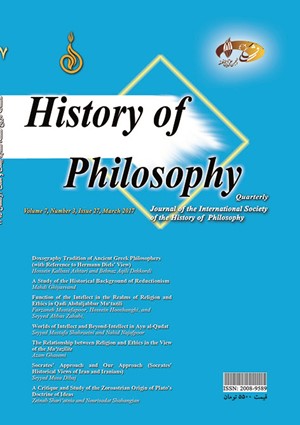-
-
List of Articles
-
Open Access Article
1 - سخن سردبیر
Hossein Kalbasi Ashtari -
Open Access Article
2 - Doxography Tradition of Ancient Greek Philosophers (with Reference to Hermann Diels’ View)
Hossein Kalbasi Ashtari Behnaz Aqili Dehkordi -
Open Access Article
3 - A Study of the Historical Background of Reductionism
Mahdi Ghiyasvand -
Open Access Article
4 - Function of the Intellect in the Realms of Religion and Ethics in Qadi Abduljabbar Mu‘tazili
Farzaneh Mustafapour Hossein Hooshanghi Seyyed Abbas Zahabi -
Open Access Article
5 - Worlds of Intellect and Beyond-Intellect in Ayn al-Qudat
Seyyed Mustafa Shahraeini Nahid Najafpoor -
Open Access Article
6 - The Relationship between Religion and Ethics in the View of the Mu‘tazilite
Azam Ghasemi -
Open Access Article
7 - Socrates’ Approach and Our Approach (Socrates’ Historical Views of Iran and Iranians)
Seyyed Musa Dibaj -
Open Access Article
8 - A Critique and Study of the Zoroastrian Origin of Plato’s Doctrine of Ideas
Zeinab Shari‘atniya Nourisadat Shahangian
-
The rights to this website are owned by the Raimag Press Management System.
Copyright © 2017-2026







